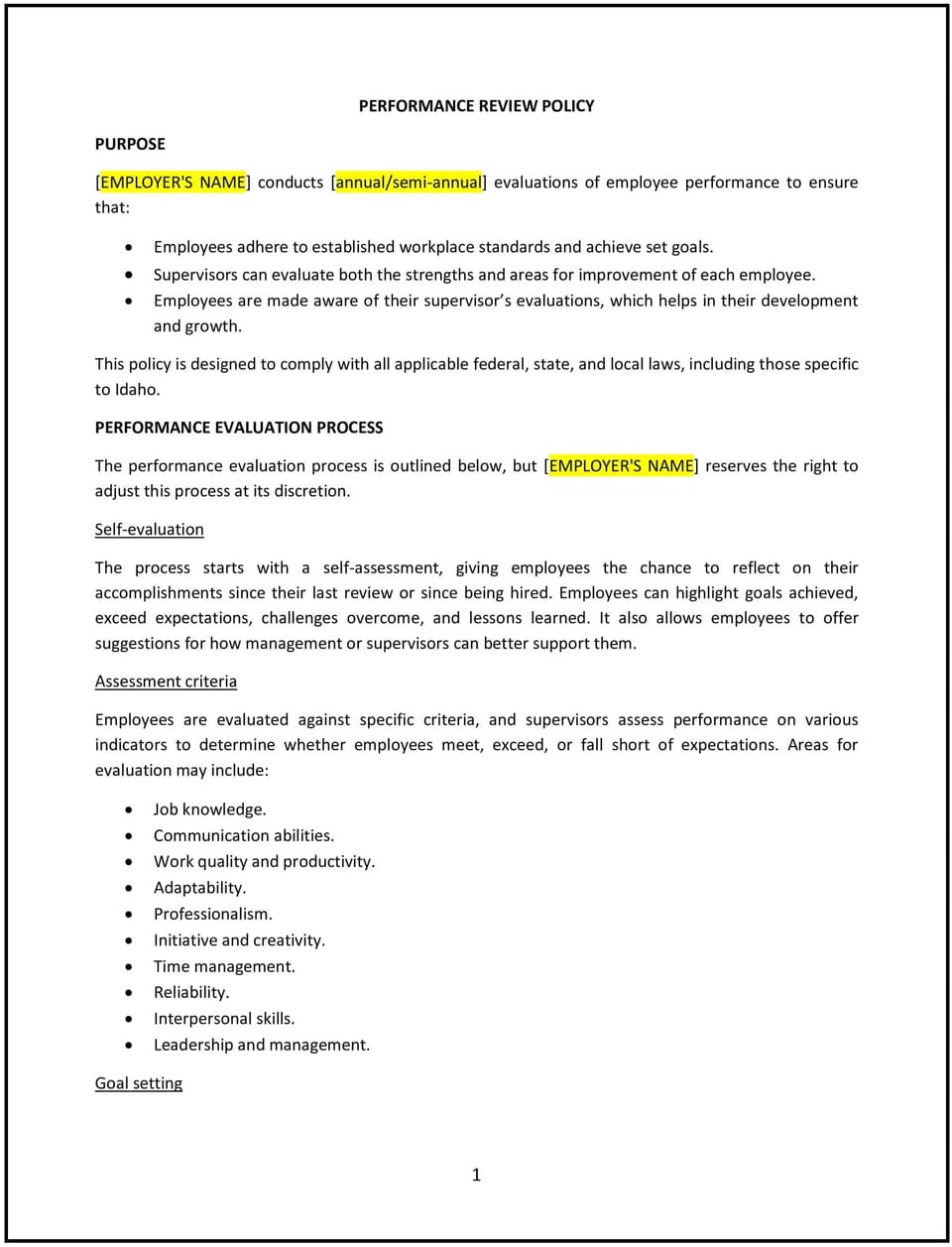Performance review policy (Idaho): Free template

Performance review policy (Idaho)
A performance review policy helps Idaho businesses establish a structured process for evaluating employee performance, providing feedback, and setting goals. This policy outlines the frequency of reviews, evaluation criteria, and the steps for conducting constructive performance discussions. It also emphasizes the importance of fairness, transparency, and employee development.
By implementing this policy, businesses can foster a culture of continuous improvement, enhance employee engagement, and align individual performance with organizational goals.
How to use this performance review policy (Idaho)
- Define review frequency: Specify how often performance reviews will be conducted, such as annually, semi-annually, or quarterly, to ensure consistency and timely feedback.
- Establish evaluation criteria: Outline the criteria used to assess employee performance, such as job responsibilities, key performance indicators (KPIs), and behavioral competencies.
- Provide feedback guidelines: Offer guidance on how to deliver constructive feedback, focusing on specific examples, actionable suggestions, and recognition of achievements.
- Set goal-setting procedures: Include steps for setting performance goals during reviews, ensuring they are specific, measurable, achievable, relevant, and time-bound (SMART).
- Address employee input: Encourage employees to share their perspectives during reviews, including their accomplishments, challenges, and career aspirations.
- Train managers: Provide training for managers on how to conduct effective performance reviews, deliver feedback, and support employee development.
- Review and update the policy: Periodically assess the policy’s effectiveness and make adjustments based on changes in business needs, employee feedback, or Idaho laws.
Benefits of using this performance review policy (Idaho)
This policy provides several advantages for Idaho businesses:
- Enhances employee performance: Regular feedback and goal-setting help employees understand expectations and improve their performance.
- Promotes fairness and transparency: Clear evaluation criteria and consistent processes ensure all employees are treated equally and understand how their performance is assessed.
- Supports employee development: Constructive feedback and goal-setting encourage professional growth and skill development.
- Aligns individual and organizational goals: Performance reviews help employees understand how their work contributes to the business’s success.
- Improves communication: Regular performance discussions foster open communication between employees and managers, building trust and engagement.
- Reduces turnover: Employees who receive regular feedback and support are more likely to feel valued and remain with the business.
Tips for using this performance review policy (Idaho)
- Communicate the policy clearly: Share the policy with employees during onboarding and through internal communication channels to ensure awareness and understanding.
- Train managers: Provide training for managers on how to conduct effective performance reviews, deliver constructive feedback, and set meaningful goals.
- Encourage employee participation: Foster a culture where employees feel comfortable sharing their perspectives and contributing to their performance discussions.
- Monitor consistency: Regularly review performance review processes to ensure they are applied consistently and fairly across all employees.
- Document reviews: Maintain records of performance reviews, including feedback, goals, and action plans, to track progress and ensure accountability.
- Review the policy regularly: Update the policy as needed to reflect changes in business needs, workforce dynamics, or Idaho laws.
Q: Why should Idaho businesses have a performance review policy?
A: A performance review policy provides a structured process for evaluating employee performance, offering feedback, and setting goals, which helps improve performance and align individual efforts with business objectives.
Q: How often should businesses conduct performance reviews?
A: Businesses should conduct performance reviews at regular intervals, such as annually, semi-annually, or quarterly, to provide timely feedback and support employee development.
Q: What criteria should businesses use to evaluate employee performance?
A: Businesses should evaluate performance based on job responsibilities, key performance indicators (KPIs), and behavioral competencies, ensuring the criteria are clear and relevant to the role.
Q: How should managers deliver constructive feedback?
A: Managers should provide specific examples, focus on actionable suggestions, and recognize achievements to ensure feedback is constructive and supportive.
Q: What steps should businesses take to set performance goals?
A: Businesses should set SMART goals—specific, measurable, achievable, relevant, and time-bound—during performance reviews to provide clear direction and motivation.
Q: How can businesses encourage employee input during reviews?
A: Businesses should create an open and supportive environment where employees feel comfortable sharing their accomplishments, challenges, and career aspirations.
Q: How often should businesses review their performance review policy?
A: Businesses should review the policy annually or as needed to ensure it aligns with current business needs, workforce dynamics, and Idaho laws.
This article contains general legal information and does not contain legal advice. Cobrief is not a law firm or a substitute for an attorney or law firm. The law is complex and changes often. For legal advice, please ask a lawyer.


